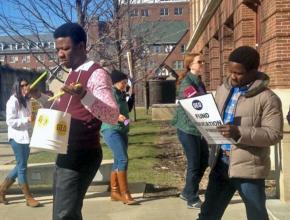UIUC grad workers strike over tuition waivers
reports from Urbana-Champaign on a strike by the Graduate Employees' Organization at the flagship campus of the University of Illinois system.
MEMBERS OF the Graduate Employees' Organization (IFT/AFT Local 6300) are on strike at the University of Illinois Urbana-Champaign (UIUC) after 11 months of stonewalled negotiations and some six months after their old contract expired.
Hundreds of members of the 2,700-strong union gathered on February 26, the first day of the walkout, to picket the entrances of major buildings on the university quad at the center of campus.
Chants of "Ho ho, hey hey, tuition waivers have got to stay" and "We're overworked and underpaid, the administration's got it made" rang out. Cowbells and bucket drums contributed to the rowdy and energetic atmosphere.
The huge throngs of students that normally pack the quad were noticeably absent, as many professors chose to cancel their classes in solidarity. At noon, GEO and its supporters came together for a major rally, followed by picketing for the rest of the day. The union is vowing to keep up the fight until the administration offers a fair contract.
The issues at stake are long-standing, including the university's attempts to go after tuition waivers, which the current contract guarantees to all graduate and teaching assistants. The administration's proposal undermines this guarantee, particularly for incoming graduate students and non-PhD students.

The vast majority of graduate students couldn't afford to attend school without these waivers. "[G]raduate students would be forced to pay up to $30,000 in order to keep a job that pays less than $17,000 per year," the union said in a statement.
This issue was brought to national attention last year with widespread protests organized by graduate students against the Republican tax bill, which threatened to tax tuition waivers.
But chipping away at tuition waivers is a long-standing priority for the UIUC administration. Previous attempts at this led to a 2009 strike that GEO won.
In addition, as GEO Co-President Gus Wood explained in an interview, the administration is "preparing to re-designate programs as 'self-supporting' meaning their funding will be severely changed to the point that many department budgets will be stripped clean."
This would allow the university to create programs staffed by graduate workers who are not part of the GEO's bargaining unit, dividing graduate students against each other and diminishing the power of the union.
In the lead-up to the strike, the university's intentions were made clear by the attempt to revoke tuition waivers from master's students in computer science, driving many of them into debt and leading to months of arbitration.
"Coming from a university that has billions of dollars in revenue, this is an outright travesty of epic proportions and the best example of how neoliberals are privatizing public institutions and pricing the working classes out of access to higher education," Wood said.
Other important issues include wages and health care. UIUC graduate workers currently make below the living wage as estimated by the university itself. Nevertheless, the university is insisting on determining wages unilaterally via a "campus wage program," leading the GEO to file an unfair labor practices complaint for failure to bargain wages.
THE UNION has been building for this showdown with several months of protests and rallies, and unsuccessful bargaining. In November, the GEO membership voted overwhelmingly to authorize a strike.
In preparation for the walkout the next day, GEO held a rally Sunday outside the room where negotiations between the union and administrators were taking place. Over 100 people attended from the union and the community at large. Speakers from GEO as well as the union for non-tenure faculty emphasized the need for solidarity and the importance of defending education as a right, not a privilege.
This strike takes place amid other major battles in the education sector, including the West Virginia teachers' strike and a walkout by university educators across the UK.
The issues in the GEO strike aren't unique to Urbana-Champaign, to higher education or even to the United States--they lie at the heart of struggles over labor and education worldwide.


